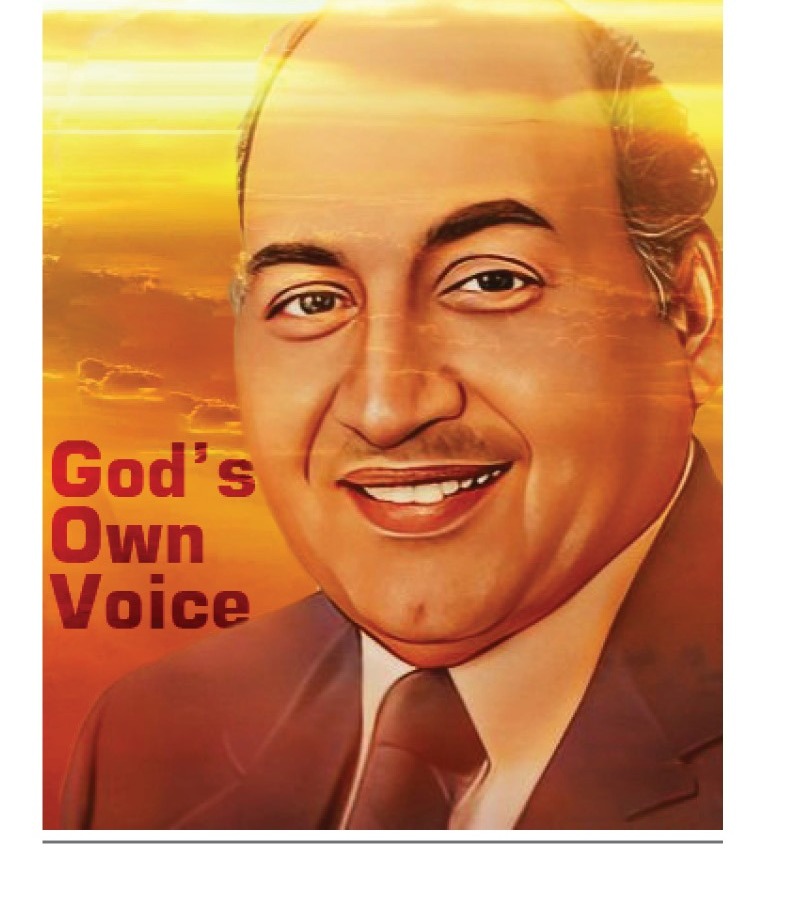A scintillating tribute to the maestro on his forty second death anniversary
Santosh Bakaya
On 31 July 1980, India felt throttled and suffocated. It had lost its musical notes. A heart-breaking threnody filled the air. There was a hushed silence. 55 was no age to go.
The sparkling sun had set, and a melodious voice had fallen silent, but even in that hushed silence, one continued to hear the pulsating notes of the greatest and the most influential singer of our times: Mohammed Rafi.
Who can deny that Rafi’s voice has ignited a fire, making our comatose hearts suddenly break free of all shackles, dancing to the lyrical cadences of a musicality that only the inimitable Rafi could inspire? It has brought warmth to cold hearts, lifting the sagging spirits. In his haunting songs, one can almost feel raindrops dripping from the eaves, the balmy breeze of a distant shore, the fragrance of verdant forests, hear the babbling brooks, the gurgling streams, touch the flamboyant houseboats, shikaras, and the peaks of snow-covered mountains.
42 years have gone by, but the haunting cadences of his notes keep echoing in the air.
The clock chimes on. The music plays on with that undying panache and finesse.
Rafi’s massive repertoire had a song for every moment – the mundane, the delightful, the quotidian, the clumsy, the funny, the dark, the light, the dreaded, the anticipated, the ordinary and the extraordinary. Many a time one has found oneself rocking in sync with the beauty of the sheer absurdity of songs like badey mian deewane aise na bano or suno suno miss chatterjee mere dil ka matter ji or sar jo tera chakraye.
Often, joy has come tapping on gentle feet, catching us unawares, while we grumble about existential angst, enveloped by a dark giddiness. Those songs of bliss, with their gentle, timorous notes have smoothened away the scars of the vulnerability of sensitive hearts.
Yes, his songs continue to roam around, bringing smiles to parched lips. Be it the rhythmic tempo of aasman se aaya farishta from An Evening in Paris (1967) or slurred words bursting forth from a drunkard’s lips in mujhey duniya walo sharabi na samjho from Leader (1964) or the soul-stirring hum bekhudi main tumko pukare chale gaye from Kaala Paani (1958), Rafi was astoundingly exceptional.
The general assumption is that Rafi reserved his best for Naushad and Sachin Dev Burman. No doubt, some of his greatest songs have been composed by these two legendary composers, but he has sung gems for others too.
Some of his immortal songs which come to mind are: o door ke musafir under Naushad’s baton; zindagi bhar nahi bhulegi vo barsaat ki raat composed by Roshan; ek haseen sham ko for music director Madan Mohan; tu Hindu banega na Musalman banega, composer N. Dutta; jaane kya dhoondt irehti hain yeh aankhen by Khayyam; mujhe dard-e- dil ka pata na tha by Chitragupt; toote hue khwabon ne tuned by SalilChaudry; tareef karoon kya uski by O.P. Nayyar; yeh wadiyaan yeh fizayen bularahi hain tumhe set to tune by Ravi; subah na aayi sham na aayi by Iqbal Qureshi;, ehsaan tera hoga mujh par by Shankar Jaikishen; Akele hain chale aao by Kalyanji Anandji; O maaji chal by Laxmikant- Pyare Lal or kya hua tera wada by RD Burman, and we can go on and on.
He sang for almost all the music composers of his time, never saying no even to newcomers. The first song he sang for Laxmikant Pyarelal was tere pyar nay mujhe gham diya in Chela Babu, released in 1967 and the magnanimous soul did not charge anything for it. This song was released long after LP had already become popular and we still believe Rafi’s first song for LP was from Parasmani (1963).
Rafi the Rescuer
The other day while listening to sun le tu dil ki sada, I could not help thinking that this should rank as one of the best he sang for the great SD.
Who can forget Rafi singing deewana hua baadal for the flamboyant Shammi Kapoor for the evergreen film Kashmir Ki Kali (1964)?
This reminds me of a particular incident of twenty years back. We were in two shikaras in the Dal Lake – my sister’s family in one shikara and ours in another. That day I was wearing red and I was afraid my husband Lalit, a Rafi fan, would teasingly break into laal chadi maidaan khadi. Thankfully, he did not.
My brother-in- law, a Kishore Kumar fan, was gushing about him and my husband about Rafi.
“There is no one like Kishore! What a genius! His flamboyant spontaneity was impeccable. Tell me, can anyone yodel like Kishore Kumar? The unrestrained gusto of his singing,” my brother-in-law went on and on.
“Comparison of these two legends is wrong. Each had a different style. Both stars sparkled in their own unique light. Both were geniuses, but, Rafi, definitely stands head and shoulders above the rest. Even Kishore’s brother Ashok Kumar held him in great regard, so did Kishore himself, and he was devastated when Rafi suddenly died,” retorted Lalit, interspersed with the splashing of oars, and the incessant chatter of the boatman.
“Kishore was greater. He was an untrained genius. No denying the fact,” my brother-in-law reiterated with a robust conviction.
My sister, meanwhile, poured kehwa from a thermos we were carrying and handed the cups around.
“Stop creating a storm in a teacup,” I put in edgewise.
“Keep your clichés to yourself. Rafi is for all times,” Lalit maintained.
It was 3 pm, the sun was shining bright. Suddenly, we heard the clouds rumbling and in minutes, right before our eyes, we witnessed a coup in the skies. The clouds had nudged away the sun. There was darkness at noon!
“There is a huge storm in the offing,” our boatman predicted.
Sure enough, there was a storm, not in a teacup, though. The boats started shaking dangerously and the canopy of ours flew away.
Unfazed by the calamity that stared us in the face, my husband broke into a song – no, not the laal chhadi one but ye vaadi-e-Kashmir hai Jannat ka nazara.
While our boats rocked precariously, and shrieks filled the air, his voice continued rising with every rumble of thunder: ye vaadi -e- Kashmir hai…
“How can you sing when all of us are about to drown?” I shouted.
“You know this hugely popular song is from Aabroo? Did you know it was picturized on an absolute newcomer?” an unfazed Lalit was throwing light on some facts about the song, in the darkness which had, by now, totally enveloped us.
It turned out that our boatman was also a Rafi fan. Soon, to our utter horror, he also chipped in full throttle: ye vadiy-e-Kashmir hai.
It was absolutely dark and two boats on the verge of drowning were steered towards the backwaters while two Rafi-possessed men sang about Kashmir being a paradise. And the great Rafi, I am sure, smiled from above.
After an hour of struggling, we reached the backwaters and waited for some time as the storm slowly tapered away, but not the song. Both were still singing ye vadiye-e-Kashmir hai.
“We could have even drowned,” the boatman admitted later.
“Come on, buddy! How could we drown, when we had Mohammed Rafi for company?” my husband quipped, whacking him on his pheran-clad shoulder.
We were left with no choice but to join the laughter of the two – though a tad timorous.
Was it really the magic of Rafi at play?
Whenever Lalit recounts that incident, it always ends or begins with: “When Muhammed Rafi came to our rescue.” His argument being, that if he hadn’t sung the song that day, all of us would have died of panic, if not by drowning. Rafi proved to be a melodious distraction.
I am yanked back to the present as a voice falls into my ears. I go to the window, it is a rickshaw puller singing mai rikshavaala main rikshawala
with the same verve that Rafi sang it with long years back for Mehmood in Choti Behan.
With a lingering sigh, it strikes me that the flame that died so many years back still burns bright, be it in a boatman’s heart, a love-besotted couple’s hearts or in the anguished heart of an unrequited lover. Or on a tired rickshaw puller’s lips! Rafi continues to live on.
Santosh Bakaya is an award-winning poet, novelist, short story writer, biographer, TEDx Speaker, essayist, creative writing mentor, internationally acclaimed for her poetic biography of Mohan Das Karam Chand Gandhi, Ballad of Bapu,


